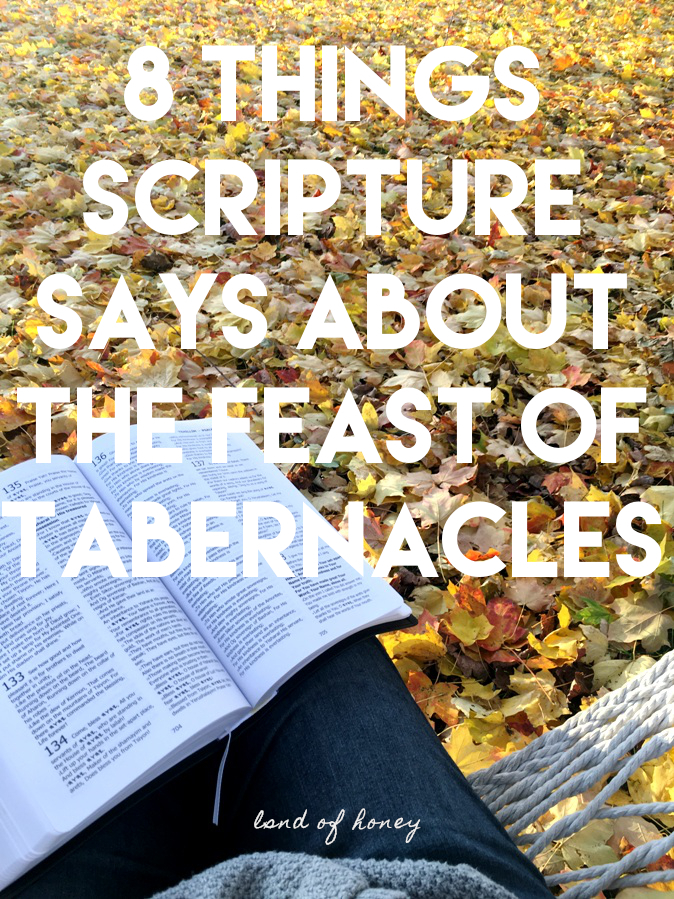Eight things Scripture says about the Feast of Tabernacles:
1. It is for all generations. -Leviticus 23:41
This isn't just a holiday for the people that lived in Bible times, or in the future once the Messiah returns. It is for you, today! No matter what part of the world you live in or your family history, YHWH wants you to set apart his feasts.
2. There are eight days of festivities, and you don't work on the first or last day. - Leviticus 23:35-36, 39
Have you ever gone on vacation and stuffed your itinerary so full that you came home exhausted? I think our Creator saw that tendency coming and purposefully set aside a couple of days of rest for us during this special time. For most of Sukkot we are permitted to do professional work, errands, and whatever else needs done. However on the first and last days we are asked to set those things aside in order to rest and focus on YHWH.
3. We should dwell in booths during Sukkot. -Leviticus 23:43
The Hebrew word for booths is sukkah, the plural of that is Sukkot which is where we get the name for this holiday. Sukkah means a temporary dwelling. Scripture does not elaborate on exactly what this looks like, so I think there is room for self expression. So part of the Feast of Tabernacles is stepping out of our normal living arrangement. Take a road trip, pitch a tent in your backyard, go to the lake, put up a canopy to eat meals under, etc. Make it a point to not stick to business as usual this week.
4. We should rejoice. -Leviticus 23:40
Like the Israelites rejoiced in Nehemiah when they celebrated the Feast of Tabernacles for the first time in generations after rediscovering Scripture's instructions, we should be overjoyed that we have instruction from the Living God on how we are to live! And you know what else? This holiday is not a burden or drudgery, it is genuinely fun! It's nice to be able to take off from work and spend time outdoors, and maybe even travel. It's also a time when we can grow more joy inside of ourselves. Keeping Scripture's instructions for the Biblical holidays and the Sabbath has made me a more joyful person in my daily life. Couldn't we all use more joy? This is a tangible way to promote that in ourselves and our families.
5. It is a reminder that YHWH made the children of Israel dwell in booths when he brought them out of Egypt. -Leviticus 23:43
Another reason we keep the Feast of Tabernacles is commemorate the history of YHWH's people, and to learn more of the Bible. The hands-on method of learning can help cement those truths in our hearts. Going to living history museums teaches children more about the ways of the past than just reading about it. Same thing with Scripture! By camping out during the Feast of Tabernacles, we learn a little bit what it was like to journey to the Promised Land. This time calls to mind the miraculous stories of YHWH's provision for his people, and teaches us to trust him more.
6. We should guard the Feast of Tabernacles. -Exodus 23:15-16
We shouldn't approach this time haphazardly, maybe celebrating if it works out. We don't get to say, "I know we should celebrate it but we are so busy/my friends aren't interested/my workplace won't cooperate." We are to guard this time. That means it's up to us to make space on our calendars and prioritize celebrating Sukkot. Be proactive and intentional about setting aside the time and resources needed to keep Scripture's instructions. Guard what is important!
7. We shouldn't appear before YHWH empty-handed, but we should present an offering according to what he has given us. -Deuteronomy 16:16-17
Though we no longer sacrifice animals, we can still give an offering during the feast. If YHWH has given you more than you need, then give to his Kingdom. Donate money to a ministry or support a missionary. Do you have more possessions than you need? Give them away during this time. This can be a meaningful part of the feast as you look for ways to meet needs and learn more about the impact ministries and missionaries are having around the world.
8. It will be celebrated in the latter days. -Zechariah 14:16
Not only will the Feast of Tabernacles be kept when the Messiah is ruling on earth, but those nations that don't celebrate it will be cut off from rain. This shows how important this time is to the Messiah! He gives blessings to those who keep his set apart times.
More posts on the Feast of Tabernacles:
What Jesus Said During Sukkot
Why You Should Celebrate Tabernacles
Sukkot Scripture Reading List
What Jesus Said During Sukkot
Why You Should Celebrate Tabernacles
Sukkot Scripture Reading List











